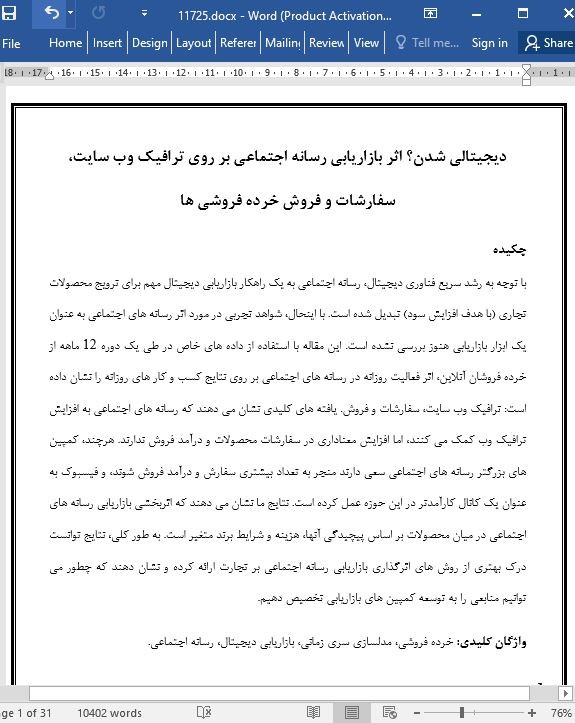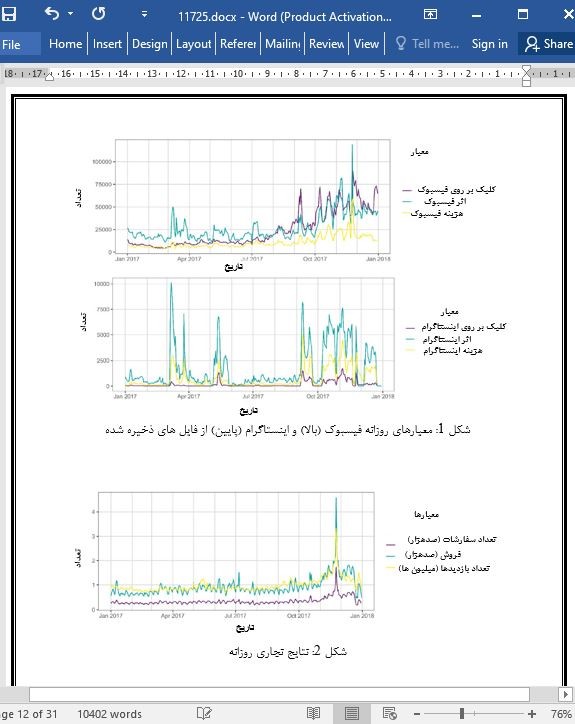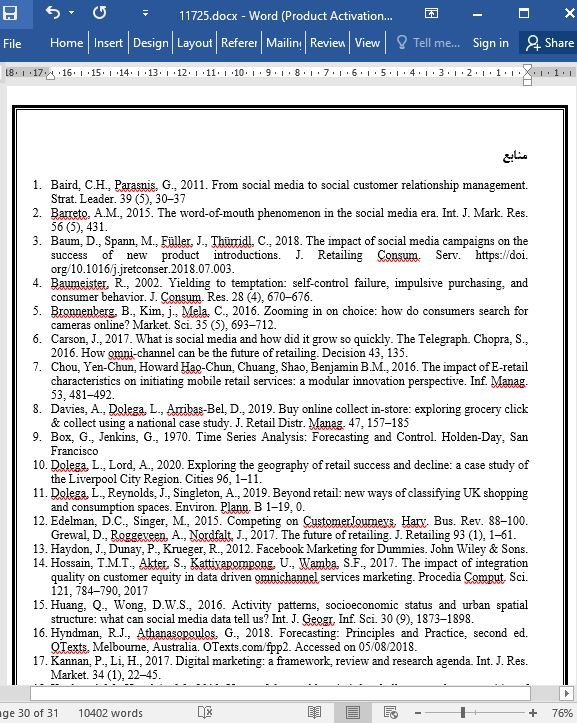
اثر بازاریابی رسانه اجتماعی بر روی ترافیک وب سایت، سفارشات و فروش خرده فروشی ها
چکیده
با توجه به رشد سریع فناوری دیجیتال، رسانه اجتماعی به یک راهکار بازاریابی دیجیتال مهم برای ترویج محصولات تجاری (با هدف افزایش سود) تبدیل شده است. با اینحال، شواهد تجربی در مورد اثر رسانه های اجتماعی به عنوان یک ابزار بازاریابی هنوز بررسی نشده است. این مقاله با استفاده از داده های خاص در طی یک دوره 12 ماهه از خرده فروشان آنلاین، اثر فعالیت روزانه در رسانه های اجتماعی بر روی نتایج کسب و کار های روزانه را نشان داده است: ترافیک وب سایت، سفارشات و فروش. یافته های کلیدی نشان می دهند که رسانه های اجتماعی به افزایش ترافیک وب کمک می کنند، اما افزایش معناداری در سفارشات محصولات و درآمد فروش ندارند. هرچند، کمپین های بزرگتر رسانه های اجتماعی سعی دارند منجر به تعداد بیشتری سفارش و درآمد فروش شوند، و فیسبوک به عنوان یک کانال کارآمدتر در این حوزه عمل کرده است. نتایج ما نشان می دهند که اثربخشی بازاریابی رسانه های اجتماعی در میان محصولات بر اساس پیچیدگی آنها، هزینه و شرایط برند متغیر است. به طور کلی، نتایج توانست درک بهتری از روش های اثرگذاری بازاریابی رسانه اجتماعی بر تجارت ارائه کرده و نشان دهند که چطور می توانیم منابعی را به توسعه کمپین های بازاریابی تخصیص دهیم.
1. مقدمه
در دهه گذشته، روش بازاریابی و فروش اجناس به مشتریان بصورت چشمگیری بر اساس عوامل فناورانه مختلف تغییر کرده است. در نوامبر 2018، فروش آنلاین در بریتانیا برای اولین بار به 20% فروش کلی این کشور رسیده بود (ONS، 2018). خرده فروشان به طور پیوسته به دنبال روش های جدید و نوآورانه ای برای دسترسی به مشتریان جدید و بهبود تجربه مشریان هستند. یک روش رایج، استفاده از رسانه های اجتماعی برای ارتباط با مشتریان، تبلیغ برندها و ترویج محصولات از طریق کمپین های بازاریابی دیجیتال و تبلیعات دهان به دهان آنلاین می باشد (گروال و همکاران، 2017).
7. نتیجه گیری
افزایش سایت های شبکه رسانه اجتماعی باعث افزایش استفاده از پلتفرم های رسانه اجتماعی به عنوان ابزار بازاریابی شده است که دسترسی مشتریان به شرکت ها را تسریع می بخشد. با اینحال، مدارک تجربی محدودی در مورد نحوه اثر رسانه اجتماعی بر این نتایج وجود دارد. تحقیقات قبلی از روش های کیفی یا از دیده های در دسترس عموم از API ها برای ارزیابی اثرات کمپین های رسانه اجتماعی مختلف استفاده کرده اند. با استفاده از دسترسی بی سابقه به یک پایگاه داده خرده فروشی بزرگ، توانستیم اثرات کمپین های بازاریابی رسانه اجتماعی بر ناتیج تجاری را تجزیه و تحلیل کنیم: ترافیک وب سایت، سفارشات محصولات و درآمد فروش. یافته های این تحلیل هم برای شرکت و هم برای جامعه پژوهشی گسترده تر قابل استفاده است. چون می تواند تحلیل کمی قدرتمندی ارائه کند که به صورت خاص اثرات راهکارهای بازاریابی رسانه اجتماعی بر نتایج تجاری را ارزیابی کنند.
Abstract
Given the rapid proliferation of digital technology, social media has become a key digital marketing strategy to promote business products, with the ultimate aim of maximising profits. Yet, empirical evidence on the impact of social media as a marketing tool remains underexplored. Using unique data over a 12-month period from a major online retailer, this paper examines the impact of daily social media activity on daily business outcomes: website traffic, orders and sales. Key findings reveal that social media leads to increased web traffic, but it does not produce a significant rise in product orders and sale income. Though, larger social media campaigns tend to result in significantly higher number of orders and sale income, and Facebook emerges as the most effective channel. Our results also reveal that the effectiveness of social media marketing varies across products depending on their complexity, cost and brand status. Taken together, these results offer a better understanding of the ways social media marketing impact businesses and provide intelligence on how to allocate resources to develop marketing campaigns.
1. Introduction
In the past decade, the way consumer goods are marketed and sold has been markedly altered with various technological factors primarily driving the change. In November 2018, online sales reached 20% of total sales for the first time in the UK (ONS, 2018). Retailers are constantly searching for new and innovative ways to reach new customers and improve the consumer experience. An increasingly popular approach involves the use of social media to communicate with customers, endorse brands and promote products through digital marketing campaigns and online (e) word-of-mouth (Grewal et al., 2017).
7. Conclusion
The growing proliferation of social media networking sites has led to an increase in the use social media platforms as marketing tool to augment consumer reach with the hopes to foster business outcomes. Yet, limited empirical evidence exists as to how social media impact these outcomes. Previous research has typically employed qualitative methods or publicly available data from APIs to estimate effects of various social media campaigns. Drawing on unprecedented access to a large retail company database, we analysed the impacts of social media marketing campaigns on business outcomes: web traffic, product orders and income sales. The findings from this analysis are set to benefit both the company and wider research community, as it provides the first to our knowledge robust quantitative analysis which specifically assesses the effects of social media marketing strategies on business outcomes.
چکیده
1. مقدمه
2. مروری بر مطالعات پیشین
2.1. دیجیتالی کردن فعالیت های خرده فروشی
2.2. مزایا و اثربخشی بازاریابی رسانه اجتماعی
2.3. اثربخشی بازاریابی رسانه اجتماعی بر روی نتایج تجاری
3. طرح مطالعاتی
3.1 معیارهای نتایج تجاری
3.2 کاربران رسانه اجتماعی
3.3 داده های رسانه اجتماعی
4 ویژگی مدل ها
4.1 مدل های ARIMAX و SARIMAX
4.2 مدل های کمپینی
5 نتایج و بحث
5.1 مدل های شرکتی
5.2 مدل های کمپینی
6 بحث
7 منابع
Abstract
1. Introduction
2. Literature review
2.1. Digitalisation of retail activities
2.2. Benefits and effectiveness of social media marketing
2.3. The effectiveness of social media marketing on business outcomes
3. Study design
3.1. Business outcomes measures
3.2. Social media users
3.3. Social media data
4. Models specification
4.1. ARIMAX and SARIMAX models
4.2. Campaign-specific models
5. Results and discussion
5.1. Company-wide models
5.2. Campaign-specific models
6. Discussion
7. Conclusion
References
- اصل مقاله انگلیسی با فرمت ورد (word) با قابلیت ویرایش
- ترجمه فارسی مقاله با فرمت ورد (word) با قابلیت ویرایش، بدون آرم سایت ای ترجمه
- ترجمه فارسی مقاله با فرمت pdf، بدون آرم سایت ای ترجمه



